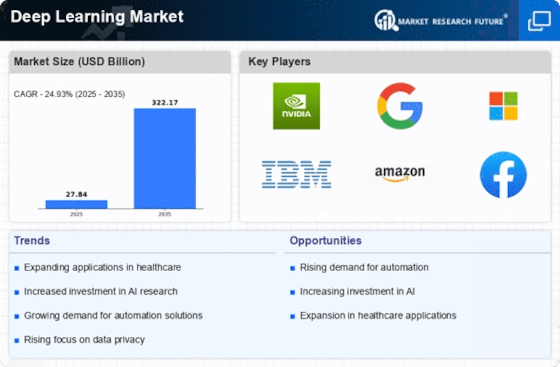Top Industry Leaders in the Deep Learning Market
Competitive Landscape of the Deep Learning Market
The global deep learning market is experiencing significant growth, driven by factors such as the increasing demand for artificial intelligence (AI) and machine learning (ML) applications, the proliferation of big data, and the advancement of hardware and software technologies. This dynamic market landscape is characterized by intense competition, with established players vying for market share alongside emerging companies offering innovative solutions.
Key Players:
- Google LLC (USA)
- Qualcomm Technologies Inc. (USA)
- Mellanox Technologies (USA)
- Xilinx Inc. (USA)
- Adapteva Inc. (USA)
- NVIDIA Corporation (USA)
Strategies Adopted:
- Focus on specialization: Key players are increasingly focusing on specific areas of deep learning, such as image recognition, natural language processing, and speech recognition. This specialization helps them cater to the unique needs of different industries and develop specialized solutions.
- Partnerships and collaborations: Strategic partnerships and collaborations between companies are a common strategy in the deep learning market. This allows companies to combine their expertise and resources to develop innovative solutions and reach new markets.
- Open-source technologies: Many key players are actively contributing to open-source deep learning frameworks and libraries, such as TensorFlow and PyTorch. This fosters collaboration within the community and accelerates the development of deep learning technology.
- Investment in research and development: Leading companies are investing heavily in research and development to stay ahead of the competition and develop new deep learning technologies. This includes investing in talent, infrastructure, and cutting-edge research projects.
Factors for Market Share Analysis:
- Market share: The percentage of the total deep learning market revenue captured by a company.
- Revenue growth: The rate at which a company's deep learning revenue is increasing over time.
- Product portfolio: The breadth and depth of a company's deep learning offerings, including hardware, software, and services.
- Customer base: The size and diversity of a company's customer base, across different industries and geographic regions.
- Brand awareness: The level of recognition and reputation that a company enjoys in the deep learning market.
New and Emerging Companies:
Several new and emerging companies are entering the deep learning market with innovative solutions and disruptive technologies. Some noteworthy examples include:
- Graphcore: This company offers specialized AI hardware designed specifically for deep learning workloads, offering high performance and efficiency.
- Cerebras Systems: This startup has developed a unique wafer-scale AI chip that offers unprecedented performance and scalability for deep learning applications.
- BrainChip: This company offers neuromorphic computing chips that mimic the structure and function of the human brain, offering a new approach to deep learning.
- Hugging Face: This company provides a platform for sharing and collaborating on pre-trained deep learning models, accelerating the development and deployment of AI applications.
Current Company Investment Trends:
Current investment trends in the deep learning market reveal a focus on specialized hardware and software solutions, open-source technologies, and AI-as-a-service (AIaaS) offerings. Companies are also investing in research and development to advance deep learning capabilities in areas like natural language processing, computer vision, and robotics. Additionally, there is a growing interest in ethical AI and responsible development practices, which is driving investments in explainability, fairness, and privacy-preserving deep learning technologies.
Latest Company Updates:
October 2023- SiFive has launched RISC-V- HPC solutions for deep learning and generative AI. The company has launched these groundbreaking products for catering to the ever-increasing needs of the high-performance computing. These novel products are poised in revolutionizing vector computing, compute density, and low power capabilities. The best part the two when merged together provide a crucial performance boost for the data-intensive computing thus paving the way for new openings in an array of sectors that comprise infrastructure, automotive and also consumer electronics.
October 2023- Associate professor for Department of Computer Science & Engineering at the Texas A&M University, Dr Tianbao Yang has of late received a handsome amount of USD 1 million from National Science Foundation for developing deep learning technologies for the medical image classification via leveraging the images as well as related free-text reports of the patients for the self-supervised learning. The self-supervised leaning in fact is a new model of machine learning which allows machines in learning from unlabelled, unprecedented data sans human supervision with the prospective to dramatically cut down the price of human labelling. Besides, this algorithm will make deep models interpretable & augment the training via sampling from multiple CT scans of patient for computation.
July 2023- Intel has lately unveiled Habana Gaudi 2, the deep learning accelerator card that is specifically designed for the Chinese market. This move aims in improving AI training & inference capacities offering efficiency and improved performance for deep learning works in China. This accelerator is optimized for supporting the inference requirements of the large-scale multimodal models.










